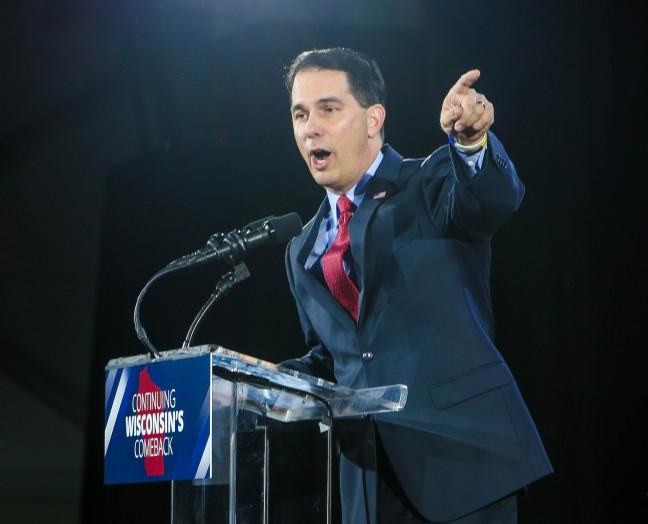As Gov. Scott Walker’s approval ratings decline at home in Wisconsin, he faces a barrage of obstacles as a governor contemplating a 2016 presidential run.
The most recent Marquette University Law School Poll found 56 percent of registered voters in Wisconsin disapprove of how Walker is handling his job as governor. Walker has predominately lost support amongst independent voters, where his support dropped from a three-year average of 50 percent to 36 percent.
Michael Wagner, a University of Wisconsin journalism professor, said he doubts Walker’s declining approval ratings will directly affect Walker’s chances to win the Republican nomination. Walker can still say he won a statewide election in Wisconsin three times, but his decline in approval does give his opponents the opportunity to attack him, Wagner said.
“A declining approval rating in Wisconsin is certainly not a death sentence, and being a popular governor doesn’t mean you’re more likely to win,” Wagner said. “Sarah Palin was the most popular governor in the country when she was the vice presidential nominee in 2008, and that did not put her and John McCain in the White House.”
Part of Walker’s lagging approval ratings can be attributed to “big proposals” in the past few months. Cutting the UW System budget, modifying the Department of Natural Resources and the new proposed Milwaukee Bucks arena are all areas that have not been popular with the public, Wagner said.
In fact, according to the Marquette Law School Poll, more than 70 percent of voters oppose cuts to the UW System and the Bucks arena proposal.
Walker told reporters after the poll came out that it’s typical for poll numbers to drop during the budget process.
“But I think a number of things will factor into that going up again, and that is when there has been little or no talk, for example, about how this budget will continue to lower property taxes,” Walker said. “There has been little or no talk about some of the other positives in the budget.”
Another contributor to Walker’s decline among voters at home is his potential presidential run itself, Wagner said. The Marquette poll found 69 percent of independents, 82 percent of Democrats and 45 percent of Republicans said they do not think governors can run for president and still handle their duties at home.
“There are a small number of people who say, ‘We support him but we don’t think he’d be a good president,'” Wagner said. “So I think there are some people who like Gov. Walker right where he is as their governor of Wisconsin, and would rather [he did] not seek the White House.”
UW political science professor Kenneth Mayer said running as a governor will set Walker up for more criticism than “Washington politicians.” Governors have more direct evidence of what they are doing, whereas Congress is often set up to make it difficult to assign accountability, Mayer said.
Statistics from Walker’s performance over the past few years will likely be magnified on the national scale as his campaign continues, Mayer said.
“It’s more difficult for a governor because you have the state unemployment rate, you have the state budget, you have more measurable outcomes that are directly tied to the decisions and policies of a particular governor, and that can make it a challenge,” Mayer said.


